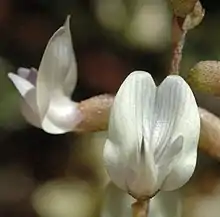| Applegate's milkvetch | |
|---|---|
 | |
| Scientific classification | |
| Kingdom: | Plantae |
| Clade: | Tracheophytes |
| Clade: | Angiosperms |
| Clade: | Eudicots |
| Clade: | Rosids |
| Order: | Fabales |
| Family: | Fabaceae |
| Subfamily: | Faboideae |
| Genus: | Astragalus |
| Species: | A. applegatei |
| Binomial name | |
| Astragalus applegatei | |
| Synonyms | |
| |
Astragalus applegatei is a rare species of milkvetch known by the common name Applegate's milkvetch.[2] Its scientific name is also spelt Astragalus applegatii.[3] It is endemic to Klamath County, Oregon, where it is known from three populations, one of which is made up of only three plants.[2] Much of the remaining habitat is seriously threatened by development, introduced plant species, and other forces.[2] This is a federally listed endangered species of the United States.
The plant is a perennial herb with clustered or spreading prostrate stems growing from a taproot. It may form mats nearly a metre wide and up to 40 cm tall. The leaves are up to 8 cm long and are each made up of several pairs of leaflets 1 or 2 cm long. The inflorescence is a raceme of nodding flowers. The flower has a cuplike, toothed calyx of sepals coated in black hairs. The corolla is whitish to lavender with purple tips on the petals. The fruit is a purple-mottled legume pod roughly 1 cm long.[4]
The native habitat of the plant is a seasonally wet floodplain with alkali soils, part of the Klamath Basin.[1]
The largest of the three populations is on land which is partially owned and protected by The Nature Conservancy, but the other part is vulnerable to development.[2] The second and third populations are very small and may not survive as they become inbred.[2] There was once a fourth population, but it was destroyed when its habitat was made into a grocery store and a car dealership.[2]
References
- 1 2 "The Nature Conservancy". Archived from the original on 2002-11-21. Retrieved 2011-01-17.
- 1 2 3 4 5 6 Center for Plant Conservation Archived December 15, 2010, at the Wayback Machine
- ↑ Peck, Morton E. (1936), "Six new plants from Oregon", Proceedings of the Biological Society of Washington, 49: 109–112, retrieved 2023-04-03, p. 111
- ↑ "USDA Plants Database".
External links
